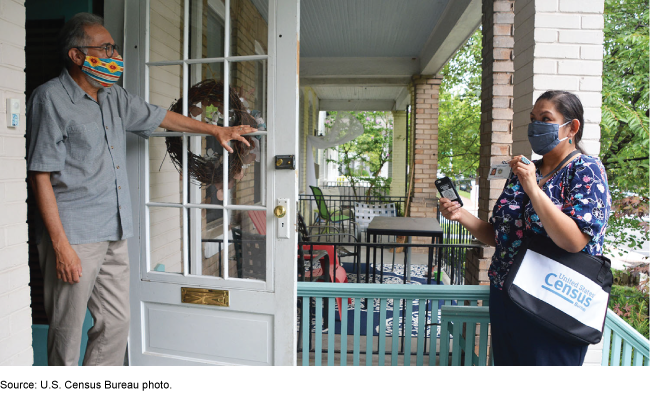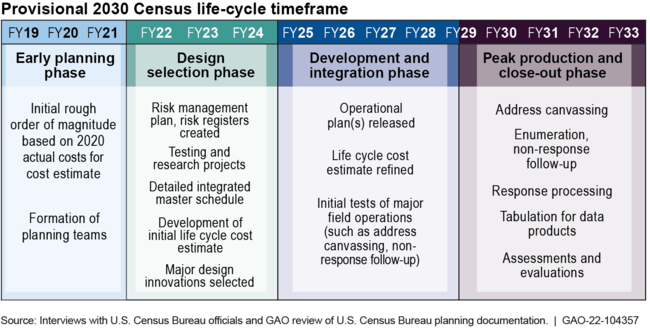2020 Census: Lessons Learned from Planning and Implementing the 2020 Census Offer Insights to Support 2030 Preparations
Fast Facts
Our work on the 2020 Census could help the Census Bureau as it prepares for the 2030 Census.
Budget uncertainties in the 2020 Census—such as funding changes—delayed or canceled activities, including some related to verifying the Bureau's national inventory of addresses. We recommended developing a plan to protect key 2030 Census research and testing from budget disruptions.
Other lessons learned include:
- Focusing on privacy and cybersecurity controls can mitigate risks in technology development
- Building on progress in program management can lead to a high-quality, cost-effective census
- Using local data can enhance national decision-making

Highlights
What GAO Found
To inform planning for the 2030 Census, the Census Bureau can leverage lessons learned from the 2020 Census related to: budgetary uncertainty; IT development and privacy controls; program management; and local-level data.
Budgetary uncertainty. The 2020 Census cycle demonstrated that budgetary uncertainty can disrupt key research and testing without adequate planning. The Bureau canceled or delayed many of its planned tests and justified the decisions citing budgetary issues, such as sequestration in 2013 and continuing resolutions in fiscal year 2017. The Bureau can likely expect continuing resolutions to continue to influence the budgetary environment. Bureau officials told us that smaller, more agile tests for the 2030 Census will help with 2030 planning. The figure below provides a provisional timeline of 2030 planning phases. A plan that specifies key research and testing can reduce overall risk to the 2030 Census.
2030 Census Planning Is Underway, with Key Milestones Expected in the Next 3 Years

IT development, privacy, and cybersecurity. The 2020 Census demonstrated that delayed IT-related decisions can impact schedules and costs. Given the Bureau's challenges in planning and developing enterprise-wide IT capabilities for the 2020 Census, it will be important for the Bureau to prioritize IT decisions early in this decade. In addition, continued attention to privacy and cybersecurity controls can mitigate risk. The 2020 Census introduced large-scale technological changes that increased the likelihood of efficiency and effectiveness gains, but also introduced many privacy and cybersecurity challenges that increased risk. The Bureau should continue to pay attention to privacy and cybersecurity controls to mitigate these challenges as it plans for the 2030 Census.
Program management. The Bureau generally made progress late in the decade in addressing weaknesses in the areas of cost estimation, schedule management, and risk management. Sustaining improvements in these areas will better position the Bureau for a high-quality, cost-effective census.
Local-level data. Prior GAO reporting shows that local data and perspectives can aid census planning and implementation.
Why GAO Did This Study
The 2020 Census, from the planning stages through the COVID-19-affected implementation, produced a unique set of experiences for the Bureau to draw on when planning future work. As GAO reported in June 2021, the census continues to be a costly undertaking, with the 2020 Census on track to cost roughly $96 per household, up slightly from $92 per household in 2010 (in constant 2020 dollars). Key features of the design for the 2030 Census are set to take shape during the next 3 years.
This report examines what lessons learned from preparing for and conducting the 2020 Census the Bureau can apply to its 2030 planning efforts. GAO reviewed planning documents for the 2020 and 2030 Censuses, prior GAO report findings related to selected program-management areas and IT systems development. GAO interviewed Bureau officials to obtain their perspectives on the 2020 Census and how they plan to incorporate lessons learned in 2030 Census planning efforts.
Recommendations
GAO has made prior related recommendations and is recommending that the Bureau develop a plan to improve resiliency of its 2030 Census research and testing activity in response to Bureau-identified budget uncertainty, including but not limited to specifying the tests and projects that are most important to conduct. The Department of Commerce agreed with GAO's findings and recommendation. The Bureau also provided technical comments, which GAO incorporated as appropriate.
Recommendations for Executive Action
| Agency Affected | Recommendation | Status |
|---|---|---|
| Department of Commerce |
Priority Rec.
The Secretary of Commerce and the Director of the U.S. Census Bureau should develop a plan to improve resiliency of its 2030 Census research and testing activity in response to Bureau-identified budget uncertainty, including but not limited to specifying the tests and projects that are most important to conduct. (Recommendation 1) |
The Census Bureau agreed with our recommendation, and in September 2022, provided numerous documents describing and demonstrating actions the Bureau was taking to improve its budget development, execution, and oversight. The Bureau has also identified two program risks to the 2030 Census related to budget uncertainty and reported drafting contingency plans for those risks. In February 2023, Bureau officials confirmed this as a priority they were working to address. In July 2024, the Bureau provided evidence of managing the two program risks related to budget uncertainty earlier in the 2030 decennial cycle than in the 2020 decennial cycle, thus providing the opportunity for more proactive mitigation planning for later in the decade. As of July 2025, we are monitoring how risks to implementation of the Bureau's testing plan are accounted for in forthcoming operational planning documents. In order to fully address this recommendation, the Bureau will need to demonstrate how its 2030 Census tests and projects that are most important to conduct are protected from budget uncertainty.
|
